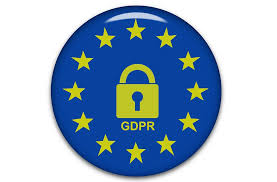I don’t know about you, but I’ve been something of an ostrich in recent times. Legalese makes my brain fry and my eyes cross so the implications of the GDPR or Global Data Protection Regulation have turned me into a cross-eyed ostrich.
 However, the internet’s boundaries are porous and we don’t always know where our blog readership comes from unless we burrow down into our site’s statistics. This means that to be compliant we need to ensure do our best to ensure that our blog meets the relevant privacy regulations and that our readers are aware of how we’re treating their personal data.
However, the internet’s boundaries are porous and we don’t always know where our blog readership comes from unless we burrow down into our site’s statistics. This means that to be compliant we need to ensure do our best to ensure that our blog meets the relevant privacy regulations and that our readers are aware of how we’re treating their personal data.
Specifically they need to know:
- What we do with their names, emails and IP addresses if they comment or subscribe.
- Give them the option to unsubscribe if they choose to do so at any point.
- Give them an option to have their personal data removed from the blog by contacting the author.
- Let them know that cookies will track them if they give permission – and give them the ability to opt out.
- Clearly state which programs we’re using.
My blogging approach:
- Firstly, my blog exists to share my research discoveries or a story.
- I want it to continue to be available as long as possible, thanks to being archived by the National Library of Australia’s Pandora Archive (which I why I haven’t changed my domain name).
- Hopefully over time my descendants will read and be interested in what I’ve discovered about their ancestors.
- I do not sell products or services via my blog.
- Nor am I overly concerned about statistical analysis as that is not my main goal.
- I want to share research steps, as well as discoveries, with fellow enthusiasts.
- To achieve all of this, and continue to publish my blog, I need to ensure that I am compliant with regulations.
The actions I’ve taken:
- I’ve introduced a Privacy Policy page on each of my blogs (should have done this long ago). In this I’ve explained what programs I use and what my approach is.
- Set up a cookies warning bar which means the reader can accept or reject cookies. Once accepted the reader will not need to choose again for a further 180 days.
- Readers who’ve subscribed to blog posts can choose to unsubscribe or contact me to remove their personal data. Readers from the EU will be required to give privacy approval before they comment. (EU readers – please let me know if this doesn’t happen)
- Be assured I will not share your email with anyone without your permission and only then if it’s relevant to your research comments.
If you have any further questions or concerns about privacy issues in relation to your personal data on my blog, please contact me directly.
